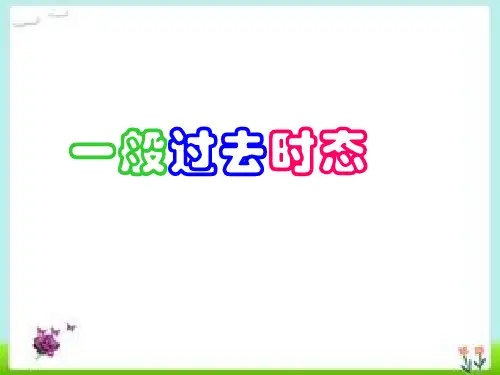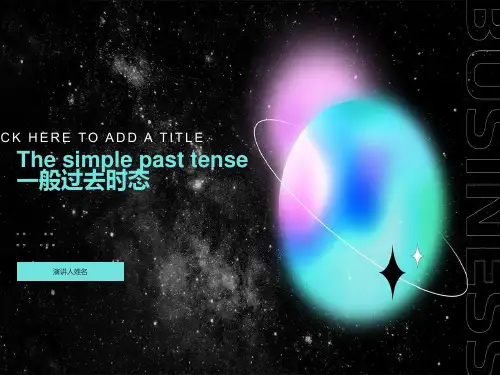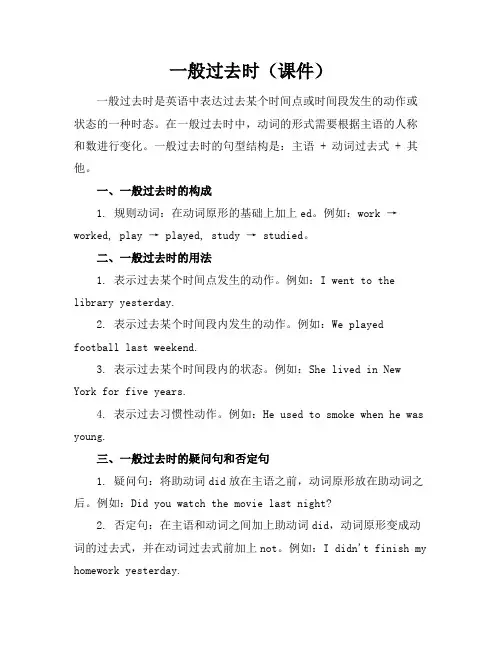讲解(一般过去时)ppt课件
一般过去时.语法讲解PPT

一般过去时常用的时间状语包括过去的时间点、过去的时间段 等,而过去完成时常用的时间状语包括“已经”、“之前”等
。
05
一般过去时的练习与巩固
填空练习
总结词
填空练习是巩固一般过去时的有效方法,通过在句子中留空,让学生填写正确的动词时态,加深对一般过去时的 理解和运用。
详细描述
在填空练习中,教师可以选择一些包含一般过去时的句子,故意去掉动词时态部分,让学生根据上下文语境和时 态规则填写正确的时态。例如,“Yesterday, I ____(go) to the park with my family. We ____ (have) a great time.” 学生应该填写“went”和“had”。
表示过去的习惯或经常发生的动作
描述过去的习惯
一般过去时可以用来描述过去经常发 生的动作或习惯,例如“He used to smoke a pack of cigarettes a day” (他以前每天抽一包烟)。
描述过去的频率
一般过去时可以用来表示过去某个时间 段内发生的动作的频率,例如“We met every week”(我们每周见面一 次)。
一般过去时表示动作已经完成,而过去进行时则表示动作正在进行中。
总结词
时间状语不同
详细描述
一般过去时常用的时间状语包括过去的时间点、过去的时间段等,而 过去进行时常用的时间状语包括“当时”、“正在”等。
与过去完成时混淆的用法
总结词 详细描述
总结词 详细描述
动作是否完成
一般过去时表示动作已经完成,而过去完成时则表示在过去的 某个时间点之前已经完成的动作。
选择练习
总结词
选择练习是一种常见的练习方式,通过提供多个选项,让学生选择符合语境和语法规则的答案,进一 步巩固一般过去时的运用。
初中英语一般过去时课件(PPT)

did
don’t/ doesn’t
She doesn’t play basketball after school. She _________ basketball after school yesterday.
do/ does
didn’t
did
didn’t watch
didn’t play
一、句型转换 1. The children had a good time in the park. 否定句:The children did not have a good time in the park. 一般疑问句:Did the children have a good time in the park? 对划线部分提问:Where did the children have a good time? 2. There were about nine hundred people at the cinema. 否定句:There were not about nine hundred people at the cinema. 一般疑问句:Were there about nine hundred people at the cinema? 对划线部分提问:How many people at the cinema?
Did
Did
go
go
规则变化 1.一般加ed
2.以e结尾加d
3.末尾只有一个辅音字母的重读闭音节词,先双写这个辅音字母,再加ed .
work —
worked
change —
changed
prefer —
preferred
stop —
小学英语时态之 一般过去时讲解课件ppt

一般过去时:
定义: 一般过去时,是表示过去某一时刻或某一段时间内发生的动作或存在
的状态。
标志词: yesterday, just now, …ago, last…, this morning …
结构: 谓语是be动词
谓语是行为动词
肯定句: 主语+ was/were + 其他 否定句: 主语+ was/were + not + 其他 一般疑问句: Was/Were + 主语+其他? 肯定句: 主语+ 动词的过去式 + 其他 否定句: 主语+ didn’t +动词原形 + 其他 一般疑问句:Did + 主语+ 动词原形 +其他?
at the weekends this morning often
usually
last Mid-Autumn Festival
every day three days ago on Mondays
tomorrow a moment ago 14 years ago
找出表示一般过去时的时间副词。
( B) 1. My mother had breakfast and____to work.
A. go B. went C. going D. to go
( A)2. -- How __ your vacation?
-- It was pretty good. A. was B. were C. did D. do
( )3.Each student one picture.
A.draw B. draws C. drawing D.to drawing
一般过去时课件(PPT)课件

用动词的适当时态填空
____ you ________ (remember) to buy the oranges yesterday? 2.Who ________ (play) computer games yesterday. 3.We _____ (go) to the cinema last night. The film _____ (be) very good. 4.What time ____ you ____ (get) to school this morning? 5.Jim ___ (do) a lot yesterday. He ____ (go) shopping and ______ (cook) supper.
lived
ate
had
made
played
cooked
Did
规则变化 1.一般加ed
2.以e结尾加d
3.末尾只有一个辅音字母的重读闭音节词,先双写这个辅音字母,再加ed .
work —
worked
change —
changed
prefer —
preferred
stop —
stopped
study —
didn’t do
Did
find any
How long did
stay
Was
any
Thank you
CLICK HERE TO ADD A TITLE
单击此处添加文本具体内容
演讲人姓名
do/ does
didn’t
did
didn’t watch
英语一般过去时PPT课件

live hope use
lived hoped used
6
3.重读闭音节词, 先双写这个辅音字母,再加—ed
stop plan
stopped planned
7Байду номын сангаас
4. 以“辅音字母+y”结尾的词, 先变“y”为“i”再加—ed
study worry
studied wd orrie
8
不规则动词 过去式的构成
was were did
went had made got
eat
say see stand find
ate
said saw stood found
18
Play Played
19
use used
20
plan planned
21
study studied
22
worry worried
23
stop stopped
一般过去时第一讲 动词变过去式
past no w
futur e
2
动词过去式 的构成
规则动词
regular verbs
不规则动词
irregular verbs
3
规则动词 过去式的构成
1、一般在动词末尾加– ed
look play start
looked played started
5
2、结尾是 e 的动词只加 -- d
否定句: →She didn’t play the violin last night.
肯定句: They swam in the lake yesterday.
否定句: →They didn’t swim in the lake yesterday.
一般过去时(课件)

一般过去时(课件)一般过去时是英语中表达过去某个时间点或时间段发生的动作或状态的一种时态。
在一般过去时中,动词的形式需要根据主语的人称和数进行变化。
一般过去时的句型结构是:主语 + 动词过去式 + 其他。
一、一般过去时的构成1. 规则动词:在动词原形的基础上加上ed。
例如:work → worked, play → played, study → studied。
二、一般过去时的用法1. 表示过去某个时间点发生的动作。
例如:I went to the library yesterday.2. 表示过去某个时间段内发生的动作。
例如:We playedfootball last weekend.3. 表示过去某个时间段内的状态。
例如:She lived in New York for five years.4. 表示过去习惯性动作。
例如:He used to smoke when he was young.三、一般过去时的疑问句和否定句1. 疑问句:将助动词did放在主语之前,动词原形放在助动词之后。
例如:Did you watch the movie last night?2. 否定句:在主语和动词之间加上助动词did,动词原形变成动词的过去式,并在动词过去式前加上not。
例如:I didn't finish my homework yesterday.四、一般过去时的特殊用法1. 过去进行时:表示过去某个时间点正在进行的动作。
例如:What were you doing at 8 o'clock last night?2. 过去完成时:表示在过去某个时间点之前已经完成的动作。
例如:I had finished my work before he came.3. 过去完成进行时:表示在过去某个时间点之前一直在进行的动作。
例如:She had been waiting for two hours when he finally arrived.一般过去时(课件)一般过去时是英语中表达过去某个时间点或时间段发生的动作或状态的一种时态。
一般过去时讲解课件(共19张PPT).ppt
否定句
1) 主语+wasn’t/weren’t+表语
He wasn’t a student ten years ago.
2) 主语+didn’t+动词原形+其他
They didn’t have a good time last night.
4.一般过去时的结构
一般疑问句
was为单数; were为复数
一般过去时的结构
4.一般过去时的结构
was为单数; were为复数
肯定句
1) 主语+was/were+表语
He was a student ten years ago.
2) 主语+动词过去式+其他
They had a good time last night.
4.一般过去时的结构
was为单数; were为复数
时间+ago类 in+年份类
yesterday morning;yesterday.... last night; last week...
two days ago in 2023
动词过去式的变化
3.动词过去式的变化 1.直接加ed work--worked look--looked 2.不发音的e结尾,去e加ed hope--hoped like--liked 3.重读的闭音节词,双协结尾字母加ed stop--stopped plan--planned 4.以辅音字母加y结尾,变y为i再加ed study--studied try--tried 5.不规则变化
What did they do last night?
总结与练习
5.总结与练习
一般过去时 1.定义:表示一个过去发生的动作或表示过去存在的状 态 2.标志词:yesterday,last...,....ago, just now..... 3.动词的过去式变化 4.一般过去时的各种句型:
一般过去时(共22张PPT)
Finish Part C on page 62.
Millie: We _____ went (go) to the Fun World Museum the day before yesterday, Daniel. It ____ was (be) so interesting! Daniel: Really? Tell me all about it. Millie: OK. We ____ saw (see) a small monkey, only 11 centimetres tall. Daniel: That’s amazing! What else? Millie: We also _____ learnt (learn) about some strange birds like dodos. They _____ lived (live) on the earth a long time ago. Daniel: That’s cool!
一般过去时的否定句 (1)be动词的否定句
I/He/She/It You/We/They
was
were was not were not at home yeou/We/They
at home yesterday.
一般过去时的否定句
(1)be动词的否定句
1.Alice was outside one sunny day. Alice wasn't outside one sunny day. 2.Mary was at home yesterday. Mary wasn't at home yesterday. 3.We were in Beijing last week. We weren't in Beijing last week.
一般过去时ppt课件
T
2.简略回答用助动词did/didn’t代替
行为动词。
Did he find the boy yesterday?
-Yes, he did.
-No, he did not (didn’t).
28
写出下列动词的过去式
1. look looked 11. go
went
2. live lived
12. have has
morning
yesterday afternoon
evening
the day before yesterday 25
4.与one 连用: morning
one
evening day
Monday afternoon
5.与that 连用:
that
morning winter day year
26
6.其他时间状语:
4.What time diydou ( geett) to school this
morning?
5.Jim di(ddo) a lot yesterday. He (go)
swhoepnpt ing and
(cook) csouopkpedr.
31
1.Lucy did her homework at home.
Does he go to school by bus every day?
Did he gtoo school by bus yesterday?
don’t/ doesn’t
didn’t
do/ does
did 10
谓语构成
1.动词 be
was , were
2.动词 have, has
一般过去时ppt课件
Past tense caught came did drew drank drove ate fell
用法 1、表示过去某个时间发生的动作或存在的状态。
He was here yesterday. I got up at six thirty yesterday morning. My father was at work yesterday afternoon. Did you have a good time last summer?
_W__a_s_ there _a_n_y__ orange in the cup?
That’s great√
为了规范事业单位聘用关系,建立和 完善适 应社会 主义市 场经济 体制的 事业单 位工作 人员聘 用制度 ,保障 用人单 位和职 工的合 法权益
再见
二OO一年一月五日
规则动词词-ed的读音
清念 /t/ ,元浊/d/ ; /t/ /d/ 之后念/id/
说明: 1、清念 /t/ ,即 ed 在清辅音后面念 /t/ ,例:finished helped
passed cooked 2、元浊 /d/ ,即 ed 在元音,浊辅音后面念 /d/ ,
例:borrowed enjoyed called moved
规则动词过去式的构成
构成规则
例词
1、一般在动词原形末尾加– ed 2、结尾是 e 的动词加 -- d
look play start live hope use
3、末尾只有一个辅音字母的
stop
重读闭音节词,先双写这
plan
个辅音字母,再加—ed
trip
4、结尾是“辅音字母+y”的动词, study
- 1、下载文档前请自行甄别文档内容的完整性,平台不提供额外的编辑、内容补充、找答案等附加服务。
- 2、"仅部分预览"的文档,不可在线预览部分如存在完整性等问题,可反馈申请退款(可完整预览的文档不适用该条件!)。
- 3、如文档侵犯您的权益,请联系客服反馈,我们会尽快为您处理(人工客服工作时间:9:00-18:30)。
句型变化 1.系动词be
陈述句(肯定): She was a doctor two years ago. 陈述句(否定): She was not a doctor two years ago. 一般疑问句: Was she a doctor two years ago?
肯定回答:Yes, she was. 否定回答:No, she wasn’t. 特殊疑问句: When was she a doctor?
5
动词一般过去时,表示过去发生的事; be用was或用were, have,has变had; 谓语动词过去式,过去时间坐标志; 一般动词加-ed,若是特殊得硬记。 否定句很简单,主语之后didn’t添; 疑问句也不难,did放在主语前; 如果谓语之前有did,谓语动词需还原; 动词若是was,were,否定就把not添。
• 为什么她去年离开了学校? Why did she leave the 时
• 1.定义: 1)表示过去某个时间发生的动作或存在的状态,常和 表示过去的时间状语连用;2)也表示过去经常或反复发生的动 作,常和表示频度的时间状语连用。
• 标志性状语
2.时间状语:yesterday last night
6
7
8
• 1. look • 4. carry • 7. call • 10.like • 13.dance • 16.stay
2. live 5. hope 8. finish 11.play 14.cry 17.cook
3. stop 6. trip 9. want 12.watch 15.plan 18.invent
3. _____________________ on Sundays. They went to the park last Monday.
4. _____________________at breakfast. But yesterday he didn’t read the newspaper.
3
• 一过去时时有两种形式: • 1.系动词be的一般过去时的形式:was(am, is), were(are) • was用于第一人称单数和第三人称单数形式的主语之后; • were用于所有其他的人称和数。 例句: He was born in 1997.
There were many mice in that room. I was so tired. • 2.实意动词过去式的形式:did(do), stopped(stop), finished(finish), studied(study), hoped(hope) 例句:She studied very hard to go to the college. They didn’t hope that the car stopped.
陈述句的否定形式借助助动词did 后,动词过去式played要 还原成动词原行play.
11
• 二.把下列句子改成相应时态
1. He usually gets up early in the morning. But ______________________ late today.
2. She usually works from 8 a.m. to 5 p.m. But yesterday __________________________
10
• 一.改错
• 1. He watch TV here ten minutes ago. 他十分钟前在这里看电视。
watch在这这个动作是十分钟前发生的,属于过去时,所以 动词里是错误的,我们要把它改成过去式watched。
。2. They didn’t played basketball yesterday. 昨天,他们没有打篮球。
9
• 不规则动词的变化规律不明显,需要平时 多加记忆。
• 1.do—did 2. is/am—was 3.are—were • 4.have—had e—came 6.put—put • 7.make—made 8.drive—drove 9.get—got • 10.eat—ate 11.dig—dug 12.dig—dug • …………
5. I usually go shopping on weekends. But this weekend __________________________
12
• 三.句型转换
1.I was so sleepy .(变为否定句) ______________________
2.He liked playing computer games.(变为否定句) _____________________
Presented by Rachel
November 8th, 2015
1
• 我昨天去购物了。 • I went shopping yesterday.
• 他昨天晚上没有看电视。 • He did not watch TV last night.
• 你过去是个老师吗? • Were you a teacher?
2. 实意动词过去式
陈述句(肯定): They went to the park last Monday. 陈述句(否定): They didn’t go to the park last Monday. 一般疑问句: Did they go to the park last Monday?
肯定回答:Yes, they did. 否定回答:No, they didn’t. 特殊疑问句: When did they go to the park?
in 1990
two days ago 等
3.频度副词:often always 等
4.例句:I got up at 7:00 yesterday. My father was at work yesterday afternoon. He always went to work by bus last year.
